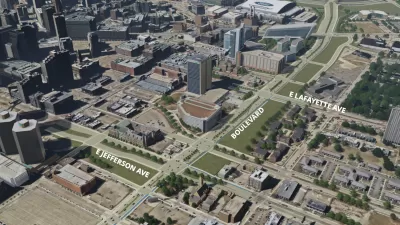The city of Cincinnati is scrambling to cover the difference on a shortfall of funding from a voluntary tax incentive contribution agreement (VTICA) system set up to support the Cincinnati Bell Connector.

Chris Wetterich reports on funding questions for the Cincinnati Bell Connector streetcar, as one funding source in particular lags behind projections. The voluntary tax incentive contribution agreement (VTICA) asks "developers to donate to the streetcar’s operations some of the savings they would receive from property tax abatements for constructing new buildings and renovating old ones," according to Wetterich.
"But VTICA has lagged and council is now left to figure out how to avoid spending down a surplus in the streetcar operations fund over the next two years while VTICA theoretically catches up," reports Wetterich. The city will receive $130,000 from VTICA in 2019, after projecting it would receive $524,000. A surplus generated by an infusion of parking revenue in 2015 will soon be exhausted. If the VTICA doesn't pick up soon, the streetcar will be about $428,000 in the red by 2020.
The article includes more detail on how the city overestimated VTICA revenue projections, and what it will possibly do as a result of the budgetary shortfall—options range from budget cuts to free rides.
FULL STORY: City Council struggles with streetcar budget as revenue source lags

Maui's Vacation Rental Debate Turns Ugly
Verbal attacks, misinformation campaigns and fistfights plague a high-stakes debate to convert thousands of vacation rentals into long-term housing.

Planetizen Federal Action Tracker
A weekly monitor of how Trump’s orders and actions are impacting planners and planning in America.

In Urban Planning, AI Prompting Could be the New Design Thinking
Creativity has long been key to great urban design. What if we see AI as our new creative partner?

King County Supportive Housing Program Offers Hope for Unhoused Residents
The county is taking a ‘Housing First’ approach that prioritizes getting people into housing, then offering wraparound supportive services.

Researchers Use AI to Get Clearer Picture of US Housing
Analysts are using artificial intelligence to supercharge their research by allowing them to comb through data faster. Though these AI tools can be error prone, they save time and housing researchers are optimistic about the future.

Making Shared Micromobility More Inclusive
Cities and shared mobility system operators can do more to include people with disabilities in planning and operations, per a new report.
Urban Design for Planners 1: Software Tools
This six-course series explores essential urban design concepts using open source software and equips planners with the tools they need to participate fully in the urban design process.
Planning for Universal Design
Learn the tools for implementing Universal Design in planning regulations.
planning NEXT
Appalachian Highlands Housing Partners
Mpact (founded as Rail~Volution)
City of Camden Redevelopment Agency
City of Astoria
City of Portland
City of Laramie





























